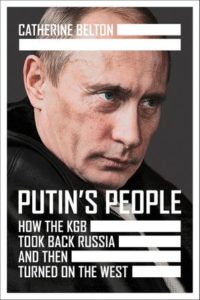 Vladimir Putin’s inner circle has been “extremely upset and shocked at the turn of events” in Ukraine, according to a leading analyst.
Vladimir Putin’s inner circle has been “extremely upset and shocked at the turn of events” in Ukraine, according to a leading analyst.
“I mean Putin was there essentially as the guarantor of stability, and everyone did very nicely out of the system as it existed,” says Catherine Belton, author of Putin’s People.
“They were able to create enormous wealth for themselves as long as they stayed on the right side of the Kremlin and did favors for Putin every now and then and carried out this much strategic task,” she tells The FT’s Gideon Rachman. “But then Putin just uprooted that and destroyed an entire system which have been built over 30 years. Everything was destroyed overnight, and these oligarchs are going through an existential crisis.”
Some kind of “palace coup” is certainly possible over the medium-term “because of everything that he’s done to undermine Russia’s stature in the world,” Belton contends:
There is a contingent of more progressive members of the security services, the foreign policy establishment, Foreign Intelligence Service, who are deeply wounded by this undermining of Russia’s entire role in the world stage that it is now internationally recognised as a pariah. I don’t think that they will let this stand. And the destruction of the Russian economy, it’s deeply destructive for everyone involved so I think he will face a systemic backlash at some point. But how and when that will happen is another question.
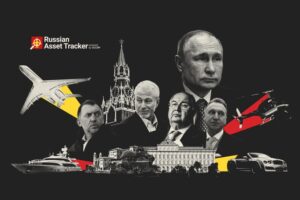
OCCRP
‘Putin may fall,’ say PRIO political scientists Tore Wig and Carl Henrik Knutsen, assessing the risk factors to be taken into account when diagnosing his regime, in light of the Ukraine crisis:
- First, it’s important to accept that the regime is a personalistic dictatorship. Such regimes have a relatively high risk of collapsing when comparing them to party dictatorships (such as Vietnam) and especially authoritarian monarchies (such as Saudi Arabia). This is because they don’t have institutions that can absorb conflicts and keep the elites at bay. Right now, there are several factors that increase the risk that the Putin regime will collapse….
- Secondly, we know that internal protests and international wars that go badly are associated with increased risk. For protests to become decisive, however, they must first become so large that it is almost impossible to suppress them.
Anticipating a post-Putin Russia, Mikhail Khodorkovsky believes that “we should unite with those Russians who see Putin as an enemy, even if they have different opinions about the Russian future.” And to this end, under the banner of the Anti-War Committee of Russia, his philanthropy is fueling three key projects, he tells The New Republic’s Jo-Ann Mort:
- “The Ark project was designed to provide support to Russian refugees who escaped Putin’s regime,” Khodorkovsky said. “Their problems are different from the Ukrainian refugees’. There are at least a quarter of a million now. We forecast that there will be two to 2.5 million of these Russian refugees leaving Putin’s regime in the next few years,” he said. ….“These are the opinion leaders,” he says of this new generation of refugees. Among them are the best and the brightest of Russian society. “We are working to ease their living accommodations, help with bank accounts, psychological support.”
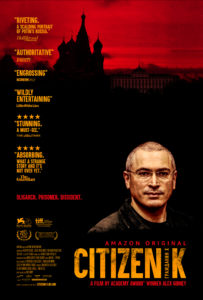 “The Sunrise project, is to help Ukraine. We purchase cargo [for transport] and deliver specific medical supplies and medical equipment where they are most needed, like in Kharkiv and Kyiv.”
“The Sunrise project, is to help Ukraine. We purchase cargo [for transport] and deliver specific medical supplies and medical equipment where they are most needed, like in Kharkiv and Kyiv.”- A third project is “designed to find a way to provide representation to that part of Russian society who no longer feel comfortable being represented by Putin,” he continued. “It is important to these people to preserve their Russian identity—this Russian diaspora—but they don’t want to be associated with Putin. There is a difference between this Russian diaspora and the entire Russian diaspora. The difference is that these people want to go back. But they want to return when Putin is gone. We want to assist them.”
Trading with autocrats promotes autocracy, not democracy, says Anne Applebaum, a fellow at Johns Hopkins University’s SNF Agora Institute, the author of Twilight of Democracy: The Seductive Lure of Authoritarianism and a National Endowment for Democracy (NED) board member.
Congress has made some progress in recent months in the fight against global kleptocracy, and the Biden administration was right to put the fight against corruption at the heart of its political strategy, she writes for The Atlantic. But we can go much further, because there is no reason for any company, property, or trust ever to be held anonymously. Every U.S. state, and every democratic country, should immediately make all ownership transparent. Tax havens should be illegal. The only people who need to keep their houses, businesses, and income secret are crooks and tax cheats.
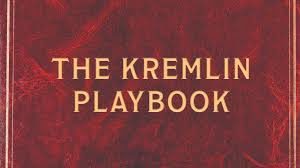
CSIS
UK Prime Minister Boris Johnson on Wednesday said Western powers should tighten the economic noose around Russia until it withdraws all its soldiers from Ukraine, AFP reports. At a hearing in parliament, Johnson told lawmakers that to lift G7 sanctions simply in return for a Russian ceasefire in Ukraine would go “straight into (Vladimir) Putin’s playbook”.
But you can’t fight Russian aggression without fighting Russian money if you’re the UK and simultaneously causing the problem that you claim to be trying to solve, Oliver Bullough, author of a recent International Forum analysis of kleptocracy, tells The Washington Post.
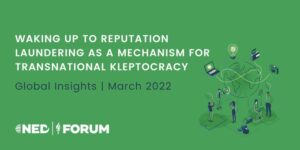 The Forum’s latest “Global Insights” report addresses the challenge of reputation laundering—the process kleptocrats use to distance themselves from the illicit source of their wealth—and offers recommendations for countering its corrosive effects.
The Forum’s latest “Global Insights” report addresses the challenge of reputation laundering—the process kleptocrats use to distance themselves from the illicit source of their wealth—and offers recommendations for countering its corrosive effects.
Putin is “the greatest kleptocrat of the modern era,” Bill Browder, head of the Global Magnitsky Campaign, told The Wall Street Journal. Browder was the largest private investor in Russia until his expulsion in 2005 for daring to investigate the theft from the Russian treasury of $230 million in taxes paid by his company.
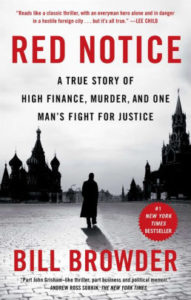 But the West’s sanctions need to go much further to hit the oligarchs as hard and as widely as possible, he insists.
But the West’s sanctions need to go much further to hit the oligarchs as hard and as widely as possible, he insists.
“The central bank is where the internal money of the government is kept—the war chest. But the oligarchs have the external money—Putin’s money—in amounts even larger than the central-bank reserves,” Browder adds. So far, only about a dozen oligarchs have been subject to sanctions. “We’ve gotten some good ones— Roman Abramovich and Oleg Deripaska and Igor Sechin. The problem is that there are 100 oligarchs. To do this properly, we need to sanction another 88.”
As influential proxies of Russian dictator Vladimir Putin, Russian oligarchs work to weaken Western democracies from within. They pay Western enablers—especially lawyers and lobbyists—millions to use their standing in democratic societies to generate policies favorable to the authoritarian regime in Russia and to silence its critics, the Helsinki Commission reports.
COUNTERING OLIGARCHS, ENABLERS, AND LAWFARE
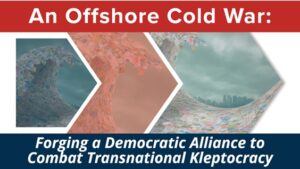 The Commission on Security and Cooperation in Europe, also known as the Helsinki Commission, will host a hearing to examine ways to counter tactics oligarchs use to launder their money and reputations and stifle dissent. Witnesses will discuss their experiences investigating oligarchs and enablers, as well as the risks of doing so, which include abusive lawsuits filed by Western lawyers on behalf of Putin’s proxies. The following witnesses are scheduled to testify:
The Commission on Security and Cooperation in Europe, also known as the Helsinki Commission, will host a hearing to examine ways to counter tactics oligarchs use to launder their money and reputations and stifle dissent. Witnesses will discuss their experiences investigating oligarchs and enablers, as well as the risks of doing so, which include abusive lawsuits filed by Western lawyers on behalf of Putin’s proxies. The following witnesses are scheduled to testify:
- Shannon Green, Executive Director, USAID’s Anti-Corruption Task Force; Senior Advisor to the Administrator
- Catherine Belton, Author, Putin’s People
- Bill Browder, Head, Global Magnitsky Justice Campaign
- Scott Stedman, Founder, Forensic News
Wednesday, April 6, 2022. 2:30 p.m. Dirksen Senate Office Building, Room 562, Capitol Hill, Washington, D.C. Watch live: www.youtube.com/HelsinkiCommission
“Putin’s Regime Is Going to End Very Soon”, @mbk_center tells @newrepublic‘s @JoAnnMort https://t.co/ySZfJGBfmU
— Democracy Digest (@demdigest) March 31, 2022







